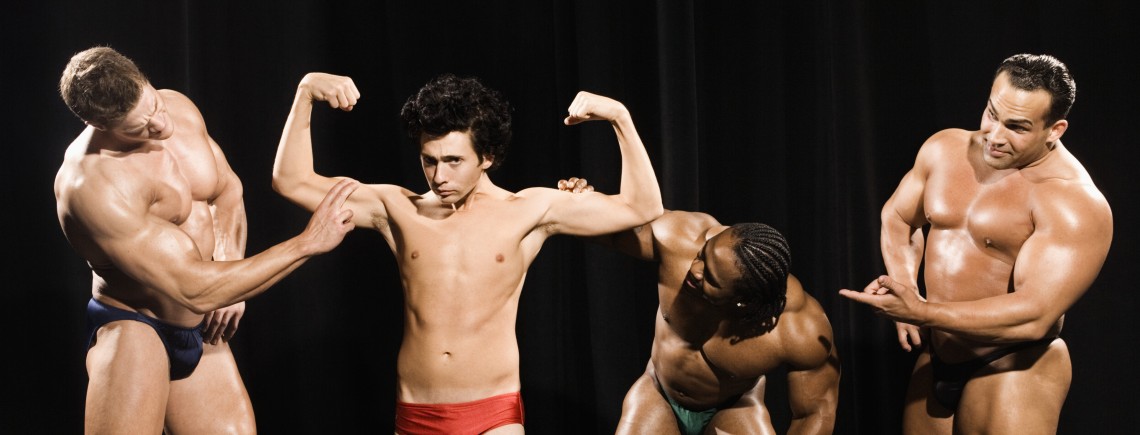Escaping Fitness Bro Culture
Like everyone else, I grew up with images of confident, muscular, heterosexual men representing the ideal image of masculinity. But when I looked at myself in the mirror I didn’t see those things – and evidently others didn’t either. As a child and teenager, I was teased for being too skinny, stigmatized for being too quiet and shy, shamed for being emotional, and bullied for being effeminate.
While I’ve long since moved on from all that youthful angst, the seeds of my experiences still affect how I measure myself as a man to this day. When I first committed to going to the gym regularly about six years back, I’ll admit that my motivation was to try to overcome the doubts I had about how “accurately” I fit my gender.
But over time, something interesting began to happen. A new image of what it means to be a strong man began to take shape, and that image was about more than having big muscles and being visibly masculine. It’s about being mentally strong; it’s about treating my body and mind with kindness; it’s about understanding that every man is different, and every man can define for himself what it means to be strong.
It isn’t always easy, though. I’m still inundated with “ideal” images of masculinity, and I’ll admit that it’s hard not to compare myself to them. But being inundated with these images doesn’t mean I have to bow to them. Indeed, part of what defines being a strong man for me is about active resistance of fitness bro culture, and here are 5 ways I do that:
1) Read fitness articles with prejudice.
The biased opinions, uneducated points of view, and clever marketing ploys of fitness bro culture thrive on the internet. I generally read fitness-related articles by first determining what idea, belief, or product the article is trying to sell me on – and from there I’m better able to extract the valuable information (if there is any). I’d also recommend reading as much as you can, including articles written by women for women. The more you read, the more you’ll be able to separate the fitness bro filler from the good stuff.
2) Resist comparing yourself to athletes, actors and other guys at the gym.
Of course there’s nothing wrong with admiring another guy’s physique or skills, but it becomes a problem when you start to compare yourself to him and wonder why you can’t get that look or build muscle that way. The reality is that all of our bodies are different and all of us have different lives. Actors and athletes have teams of people telling them what to eat; they have time to spend every day in the gym; plus, who knows what sort of “helpers” they’ve used along the way.
When you’re at the gym, you do you. You lift the weight that feels right, you do the moves that you choose, and you look just as nature designed you.
3) Don’t skip leg day.
There is a tendency in fitness bro culture to spend the majority of our gym time on the aesthetically pleasing muscles of our upper body – and while upper body strength is important, a different level of physical and mental strength comes from focusing on the body as a whole.
In comparison to upper body days, the days when I work out my legs and core are much more intense and require more focus, determination, and perseverance. You start to carve out a new place in your mind where you can go to find the strength needed to push through your boundaries – which is something you miss out on when your main goal is building a chiselled chest and bulging biceps.
4) Explore food.
Fitness bro culture dictates that men are men because they eat copious amounts of meat (especially bacon) and supplement with expensive powders like whey protein. Woven into this mindset is the notion that “real” men just don’t care about making healthy choices – that’s really more of a feminine quality (because men are invincible, right?).
Read about food. Ask questions. Try new things out. Make healthy choices that go beyond simply eating copious amounts of animal protein as your only dietary criterion. Choosing to treat your body with kindness shows far greater strength than allowing fitness bro culture to make those decisions for you.
5) Understand that strength isn’t just about having big muscles.
Truly strong men are not necessarily those with big muscles. There are many different kinds of strength, just as there are many different kinds of men. Part of escaping fitness bro culture is understanding that strength has nothing to do with aesthetically pleasing muscles; strength is also about balance (physical and mental), commitment, cardiovascular health, flexibility, mental perseverance, self-awareness, emotional intelligence, and the list goes on.
Bonus tip: On behalf of myself and everyone else at the gym, please don’t douse yourself with Axe body spray in the change room.
Escaping fitness bro culture is an ongoing effort – but a worthy one. The reality is that not one of us can precisely meet the “ideal” image of masculinity. Rather than interpreting that as a failure, redefine your so-called “differences” as qualities to be celebrated, as opportunities for self-amplification, and as the very essence of how you define what it means to be a man.
Now that’s what I call strength.
Originally posted, March 2016



